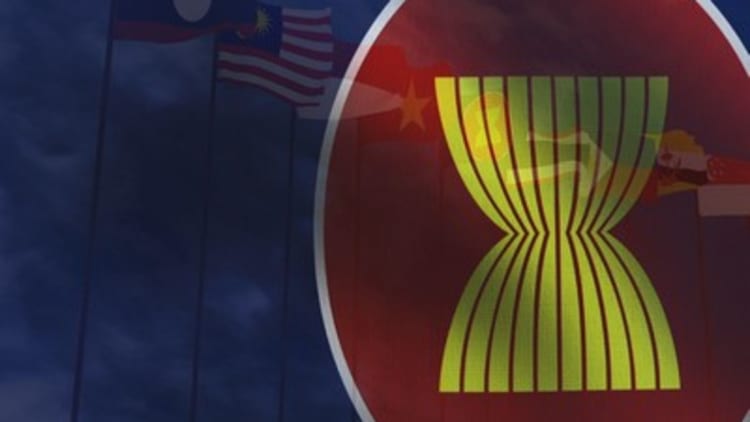During United States President Donald Trump's five-nation trip to Asia in 2017, he stopped by the Philippines.
He wasn't there just to meet outspoken Filipino president Rodrigo Duterte — he was there for the Association of Southeast Asian Nations (ASEAN) Summit.
Trump was joined by some of the world's most powerful leaders at the event, including Chinese premier Li Keqiang, Japanese prime minister Shinzo Abe, Indian Prime Minister Narendra Modi and even United Nations Secretary-General Antonio Guterres.
Their presence underscored the growing economic and geopolitical importance of the 10-member Southeast Asian organisation, even as it struggles to deal with pressing issues such as the Rohingya crisis and the ongoing dispute about territory in the South China Sea.
CNBC explores the significance of the 51-year-old regional alliance.
The ASEAN economies
ASEAN is a regional grouping of 10 countries: Brunei, Cambodia, Indonesia, Laos, Malaysia, Myanmar, the Philippines, Singapore, Thailand and Vietnam.
At first glance, it might seem like a group of still-developing countries, but, as a whole, ASEAN is a powerhouse. If it were a country, ASEAN would be the world's fifth-largest economy.
According to the latest International Monetary Fund World Economic Outlook figures, ASEAN countries' gross domestic products combined to $2.73 trillion in 2017, putting the group ahead of the United Kingdom's 2.63 trillion and India's $2.61 trillion.
ASEAN is set to grow even more quickly, as some countries like Vietnam and the Philippines boast huge growth rates. Last year, Focus Economics estimated that ASEAN's growth had reached a five-year high of 5.2 percent.
Part of that fast growth is because of ASEAN's demographics: It has the world's third-largest labor force of more than 600 million people. That's behind China and India, but ahead of the European Union and the United States.
The regional group is also set to reap a demographic dividend because more than half of that population is below 30 years old.
Geopolitical significance
ASEAN was founded at the height of the Cold War to contain communism, but it now counts communist countries among its members. From the 2000s, China began to court the group more actively through trade and investment, and Asia's largest economy is currently ASEAN's biggest trading partner.
The South China Sea issue has emerged as a flash point of conflict between ASEAN and China — and within the group. Four ASEAN countries are claimants to parts of the waterway, while China claims sovereignty over the entire area.
In 2012, the 10 states failed to issue a joint statement for the first time in the group's history because the nations couldn't agree on how to deal with China's claims.
The South China Sea is also the site of tension between the two largest economies in the world. While the United States says it does not take sides in territorial disputes, it has sent ships and planes near contested islands, calling them "freedom of navigation" operations. This year, it sent one of its nuclear-powered aircraft carriers into Vietnamese waters for the first time since the end of the Vietnam war. China followed with what it called the largest naval display of its kind.
China's growing clout is unnerving some Southeast Asian countries. For one, Indonesia, the group's largest economy, is now lobbying ASEAN to patrol its waters.
Still, the dynamics of ASEAN's internal and external relationships with countries are continually evolving. Although the Philippines had fought China in an international legal case about the South China Sea, Duterte has pursued stronger ties with Beijing.
Some ASEAN countries like Vietnam are also reaching out to new allies. Additionally, Australia held its first special summit with the group in March, during which Indonesian President Joko Widodo openly endorsed Australia possibly joining the ASEAN.
Criticism
ASEAN has come under fire for its emphasis on consensus to resolve issues, and its principle of noninterference in the domestic affairs of nations.
Some experts, like Mark Beeson of the University of Western Australia, Perth, have said that has led to ineffectiveness. He wrote that "politics of the lowest common denominator has tended to prevail and difficult problems have been avoided rather than confronted."
Joshua Kurlantzick of the Council on Foreign Relations told CNBC via email that "ASEAN has been a success at its original function, to prevent inter-state conflict within Southeast Asia."
He said, however, he did not think ASEAN as an organization "really plays much of a role in balancing outside regional powers; countries in the region still prefer to handle their strategic affairs bilaterally."
And on the economic front, he assessed that ASEAN has had "some success" at integration. However, he said it is unclear if the organization would be able to achieve greater regional integration because there may not be sufficient desire for that among the member states.



